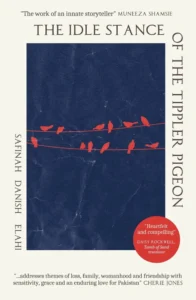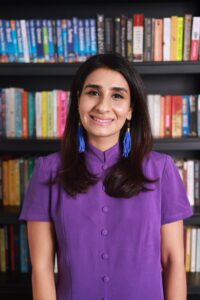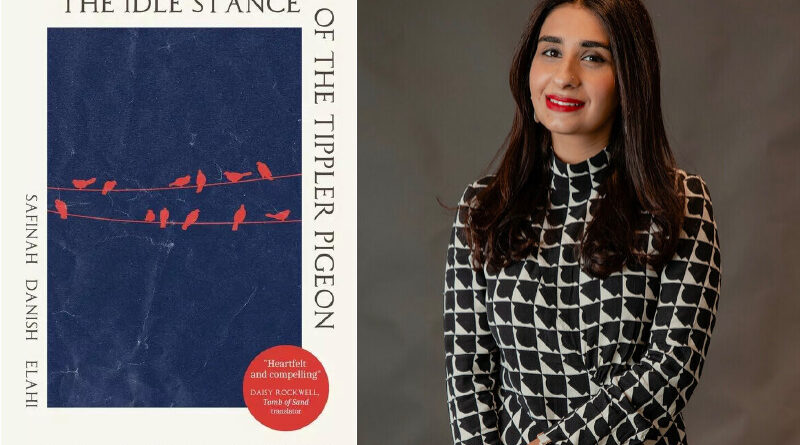About the Author
Safinah Danish Elahi is a lawyer by training. She is the author of the poetry collection The Unbridled Romance of Love and Pain (2019) and two novels, most recently The Idle Stance of the Tippler Pigeon (2023) and Eye on the Prize(2020) which has since been turned into a TV film. She also contributes to Pakistani newspapers and magazines, and is the founder of Reverie Publishers, whose goal is to guide the country’s emerging writers.
Book Review
Buy the Book: Neem Tree Press
Safinah Danish Elahi’s new novel The Idle Stance of the Tippler Pigeon, published by Neem Tree Press, is a story of unexpected grief that shattered a family and a heartwarming friendship. Through her characters, Safinah explores poignant agonies and struggles of human life.
 Although different from her first novel (Eye on the Prize, recently adapted for TV), she retains the delicate artistic style and unique perspective that resonates with all, especially Pakistani women. At one point in the novel, one of the characters Nadia said,
Although different from her first novel (Eye on the Prize, recently adapted for TV), she retains the delicate artistic style and unique perspective that resonates with all, especially Pakistani women. At one point in the novel, one of the characters Nadia said,
“I felt like a prey as I walked the streets, and found no refuge in my work nor home, and Mubashir would be carrying on without a care in the world. Isn’t the husband supposed to be taking care of the wife’s well-being in every way possible? Isn’t that what they love to tell wives? Or is it only when she does something supposedly objectionable that a man suddenly becomes aware of his wife’s existence, only to burn, stab, or shoot her?”
In another monologue, Nadia said, “I had been taught to keep my husband’s purdah, to stay quiet, not to make apparent his flaws, not even to him. A man’s ego must not be offended; it must be protected at all costs.”
The Idle Stance of the Tippler Pigeon will make you think. It makes you have all these questions. Can we get past grief? Is it fair to be joyful again after a tragedy? And what if grief never allows us to be happy again? Her characters Nadia, Zohaib, Faiza, and Masood Hashim represent denial, anger, depression, bargaining, and acceptance, which reminds me of the five stages of grief as described by Elizabeth Kubler-Ross in her book On Death and Dying. What is inspiring is Safinah’s unmatched talent for exploring grief from different perspectives.
So, where did it all begin?
Does she always want to be an author? A storyteller?
While sipping coffee and having an engaging conversation, Safinah revealed that she had never considered becoming a writer while growing up.
Tell us about Safinah Danish Elahi as a person and how this person transforms into an author?
I would have liked to give a mysterious answer as authors are meant to give, but in the modern world, the mystery is usually nullified by the constant social media presence. I’d say I’m an observer of the world, perceptive and intuitive, which helps me develop character arcs that are three dimensional and storylines that resonate with any reader regardless of race, gender, class. I’m also a lifelong reader, editor and student. I have two children that give me great insight, and I’m very active in sports. I have a law background that helps me navigate legality in my writing, other than that pretty standard Pakistani woman.
You have been touring for your book, meeting people all over the world, how does it feel to be a female South Asian author? Do people come up with preconceived notions? How do you deal with it?
I feel the perception people have of a South Asian/Pakistani woman is firstly through a lens of oppression. While I don’t necessarily disagree that culture has played a role in limiting our capacities, I do feel like we have a lot to offer to the world. While I feel I have the privilege to receive a sound education and agency to make my decisions, a lot of women in the Global South don’t. This is why I feel the need to tell stories that voice the collective struggles of relationships on a deeper level than Pakistani writing has previously engaged in.
You have explored grief through your characters Nadia, Zohaib, Faiza, and Masood Hashim. Although these characters are different from each other, of different ages, genders, and generations, their grief was same. They were just experiencing it on different stages, including denial, anger, bargaining, depression, and acceptance. Grief is a universal experience that resonates with everyone. How difficult was it to write about it with so many different perspectives?
 Initially, the epistolary style was only going to incorporate Zohaib, Nadia and Misha, but later I felt like I wanted the parents’ voice incorporated as well. I wanted to show how different people process grief and while that was definitely difficult to manage, initial character sketches helped. Once you know your character inside out, you’re able to navigate their reactions to life events. I do try to stay away from stereotypes.
Initially, the epistolary style was only going to incorporate Zohaib, Nadia and Misha, but later I felt like I wanted the parents’ voice incorporated as well. I wanted to show how different people process grief and while that was definitely difficult to manage, initial character sketches helped. Once you know your character inside out, you’re able to navigate their reactions to life events. I do try to stay away from stereotypes.
How do you come up with the title The Idle Stance of the Tippler Pigeon?
It is fascinating, and the philosophy behind it is intriguing. I found Tippler Pigeons compelling and always used to wonder as a child where they sit in the natural ecosystem. Upon research, I found out that these Pigeons are actually race birds, contrary to my initial belief that they just sit around idle all day. I wanted to have a title that incorporates the theme that there is more than meets the eye. Things are not always as they seem unless you look deeper. Another thing about these pigeons is their endurance, and I wanted to equate the endurance of my characters in the aftermath of a tragedy.
There is one instance where Nadia reminisces about that dreadful day when local police arrest her without any evidence. As an adult, she was enraged by an unlawful and unjust society favoring the affluent. First, I think it is incredible how you incorporate information about our legal system within the story without being preachy. Literature has a history of promoting legal literacy. Is it a deliberate choice or just the demand of the story? Do you think about the impact if we mainstream our rights?
I do have a law background and I see myself peppering my stories with a little bit of legal literacy. I think the purpose of good literature is to educate in a manner that allows thought to flow freely without it being preachy. I hope I’ve managed that. I tried to mirror how the affluent get away with a lot more than the law allows them to, while the underprivileged have a lot of answers for. Sadly, these are the ways of the world, at least in Pakistan.
“With every baby girl’s birth, there is a measure of violence the world allots her. I reject this allocation of violence. Those who get comfortable with oppression do not change their lives. It is time I changed mine.”
Nadia promised herself in one of the monologues to never accept violence and oppression. She is one of the strongest characters I have come across recently, what inspired you to write about Nadia?
I wanted to write a character like Nadia who is not necessarily likeable. However, whether you like her or not, you definitely respect her. I wanted to show how she is plucked from a class and thrown into another, and depict repercussions of such an upward movement, good and bad. And I finally wanted to show how she takes agency; usually women are shown to celebrate sacrifice, I wanted to show someone with the courage to change her destiny even after horrific things happen to her.
What do you think about Publishing in Pakistan?
Publishing is in its infantile stage in Pakistan. We had most fiction publishers sprout up after the book ban, and have no distribution networks, no collaborative platforms, no government support. But I see so many promising stories, that I have hope that in a few years (if we sustain this now) we should be able to replicate our neighbors and readership will grow.
When we spoke about publishing, involuntarily, education in Pakistan came up. Pakistan has a raw talent for storytelling, but it is a reality that we do not have institutions that can provide advanced courses about the field or anyone to learn from. Editors, aspiring writers, and literary reviewers have to learn on their own. Even aspiring publishers have nowhere to go except to learn from their good or bad experiences. Do you think it will contribute to the plight of the Publishing industry in the long run?
I think with Reverie, I’m trying to do what I couldn’t find when I wrote my first novel. I want to be able to provide a platform to new voices and support to editors I hire that it becomes a learning experience for them as well. I am an editor as well, and I supervise editing of manuscripts too. Hopefully we have also started hosting masterclasses to form an ecosystem that supports writing and editing.
Have you already started working on your next book? Or are you waiting to be inspired? Share some details.
I began writing my next novel at my residency in Iowa. I had written a few early drafts of stories but they weren’t speaking to me. I was going through something like a caretaker’s fatigue and felt that I could write a story concerning many elements of mental health. Although it is similar thematically, it’s a completely different approach stylistically; something I’ve never tried before. I hope it ends up being something different.
Tell us about Reverie’s work. Are there any new projects we should be looking out for?
We’ve just released a beautiful memoir: it’s a collection of essays called Apocalypse Babies. We will also be publishing the International Booker Prize Winner, Tomb of Sand. Furthermore, we’re doing the Zeenat Haroon Anthology and the Salam Award Anthology. So lots of exciting projects to look out for.
If you have to recommend one of your books to someone, which one it will be and why? Your poetry collection The Unbridled Romance of Love and Pain, your first novel Eye on the Prize or The Idle Stance of the Tippler Pigeon?
I would definitely recommend The Idle Stance of the Tippler Pigeon, not because it’s recent but I feel as a writer one grows and is ready to experiment a little bit more. I think my next work would be even more challenging to complete, because one is in a continuous state of learning and improvement.
Nuzhat Nisar is an academic writer, editor, and translator. With over ten years of editorial experience, she is currently associated with Paramount Books as an editor, working on school textbooks and curricula. She studied Urdu, Mass Communication, and Education at the University of Karachi and has a Master’s degree in Political Science. She believes in promoting regional languages and equal opportunities in education and an avid supporter of equal rights for women. She also contributes to digital platforms as an independent journalist.
@NuzhatNisar (Twitter)
nuzhat_nisar10 (Instagram)











